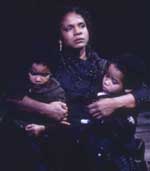
When Michael John Lachiusa works in musical comedy – notably in Hello Again, but also elsewhere – he is on safe ground. But he has written that there are no significant differences between the musical and opera, and he has ambitions in that direction, as his current Marie Christine strongly suggests. Unfortunately, it is an unholy mess that tosses more unrelated and indigestible things into the pot than, if they were tossed out, an entire kitchen sink could hold.
LaChiusa wrote the work for Audra McDonald, as a retelling of the Medea story set in turn-of-last-century New Orleans and Chicago. Two things prove immediately and glaringly wrong with his book – or is it libretto? He often cannot find proper new equivalents for the mythical tale: The daughters of Pelias are reduced from 50 to 2, and their killing of their father becomes a brief danced hugger-mugger, too opaque for the uninitiated. The book is so episodic and disjointed, in so many clashing styles, that it suspends more goodwill than disbelief.
The mise-en-scène, by the director-choreographer Graciela Daniele, is equally untidy and confusing. Christopher Barreca’s set is a round arena behind which stretches a steeply raked platform, half of which sometimes turns into a set of stairs. Behind it, lampposts may waddle in; above, chandeliers may do a round dance. To the left of the arena is a pie-slice-shaped set of bleachers, where supporting players and chorus members may sit when they’re not seated in the auditorium. This is all very grand, but cohabits poorly with supposedly intimate scenes in private rooms, which one stick of furniture surfacing through a trap door sheepishly tries to convey.
The lighting, by Jules Fisher and Peggy Eisenhauer, is meant to help situate us but often grandly overshoots the mark as it tries to project the misadventures of the Creole beauty Marie Christine with the fickle sea captain Dante Keyes from Chicago onto a cosmic, mythical plane. Her voodoo (or voudon) skills are underscored by a drummer, perched high above stage right, who periodically beats out a devil’s tattoo.
Presently, a new clashing element obtrudes: a Chicago brothel run by the madam Magdalena, a favorite hangout of Boss Gates’s gang. Here Dante, Gates’s protégé, is stumping for political office, and also performs a love dance with Gates’s daughter Helena, for whom he is dumping Marie Christine. In this dance, the now pathetically pursuing Marie joins in with unintended overtones of a ménage à trois.
Magdalena unwieldily intrudes. In the brothel, she provides crass comic relief, reducing the show to a stale Wildhornish musical. Then she reappears as a supposedly serious character (King Aegeus, in drag, no less) who, in exchange for being made fertile by Marie’s magic, promises to get Marie’s little boys back to her within a month if only she will yield them up to their father, Dante, who ferociously claims them. How she would manage that we’re not told, and Mary Testa’s camping as Magdalena drags the show further down. The ineptly conceived murder of the boys is resoundingly anticlimactic.
And the score? In trying to be operatic, LaChiusa, whose lyrics are serviceable, comes up with music that tends to be thwartingly dissonant, indeed chaotic. When it deigns to turn up a melody, it is simplistic and has-beenish. And what pretentiousness! Thus one of Marie’s brothers sings a totally out-of-place setting of Jules Laforgue’s poem “Complainte de Lord Pierrot” in a French that might as well be Swahili. No wonder Marie promptly stabs him to death.
Audra McDonald is a fine singing actress who, as Marie Christine, does everything vocally and histrionically possible to keep us involved. Anthony Crivello’s Dante is less impressive, and the rest are a mixed bag. But Toni-Leslie James’s costumes are apt and, when required, elegant, and Jonathan Tunick’s orchestrations toil valiantly. But such peripheral virtues can no more hold this patchy show together than Band-Aids could Apsyrtus, the chopped-up brother whom the mythic Medea threw in the path of her pursuers. The many previous retellings of the Medea story all strove to tell us more about the troubled heroine; only Marie Christine is content to tell us less.